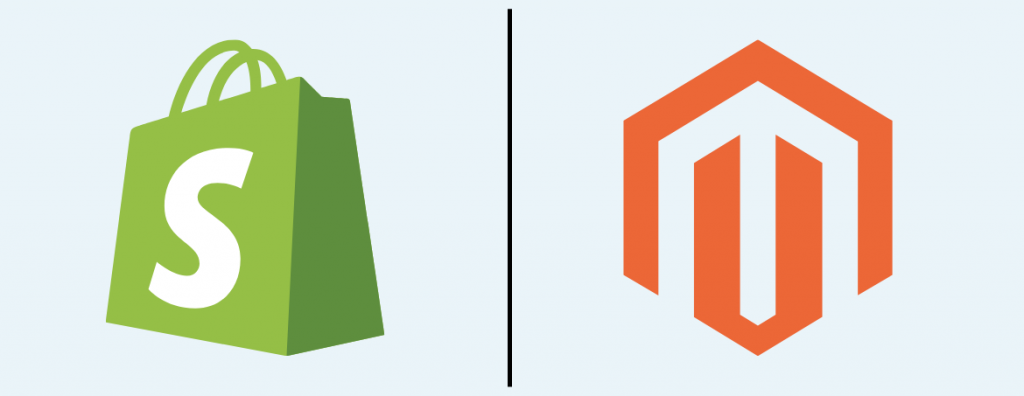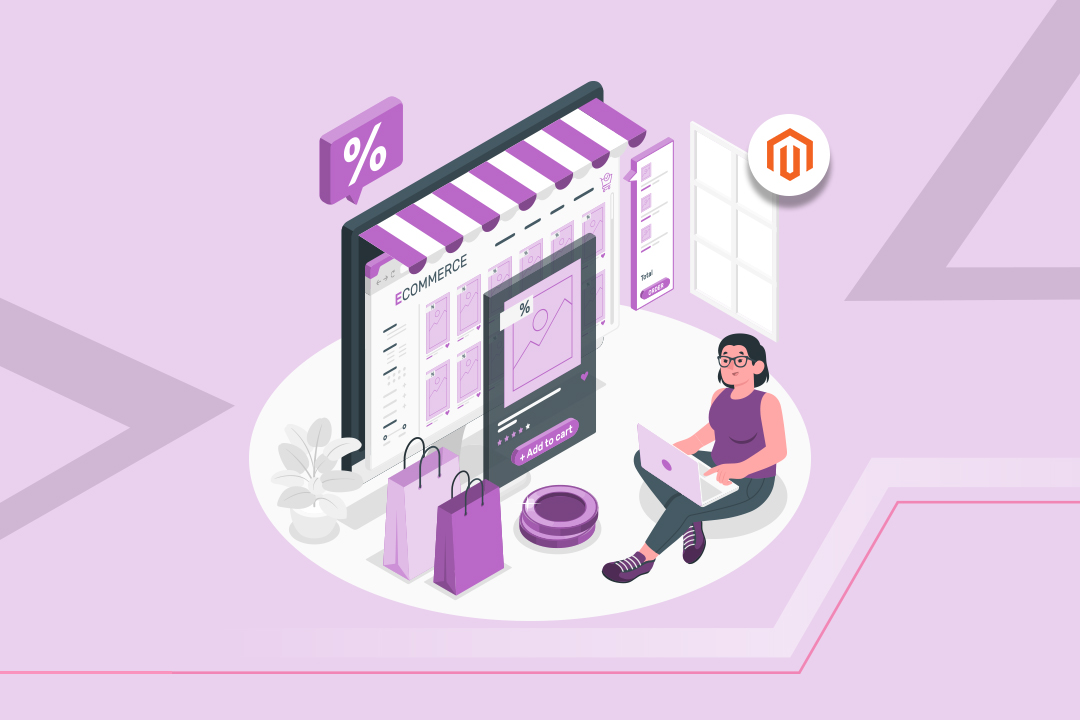Magento is a popular eCommerce platform that has seen ongoing growth since 2008, progressing over the years while staying true to its roots. It’s easy to use and powerful enough to handle even the most complex stores. Magento allows you to create a unique online store that perfectly fits your brand, products, and customers. So, if you are looking to dropship or straight upsell products, you should consider doing so on the Magento eCommerce website.
Magento is popular among major retailers, small businesses, and startups alike for its many features, including a robust catalogue system, powerful search engine optimization (SEO) capabilities, and extensible architecture. All of this comes with a price tag that’s a fraction of what you’d expect from such an advanced platform. However, with the ongoing competition between the multiple eCommerce platforms vying for attention, many online store owners are still unaware of the fact that using the Magento eCommerce platform to run their online stores could increase their business manifold. So if you haven’t jumped onto the Magento bandwagon yet, this article is for you.
Content Index
- What Is the Magento Platform?
- Why Is Magento Used Widely for eCommerce Websites?
- Magento vs. Magento 2
- Magento vs. WordPress
- Shopify vs Magento
- 4 Best Magento Extensions
- 5 Best Websites Running on Magento
- Conclusion
- FAQs
What Is the Magento Platform?
Magento Commerce is a powerful, flexible, and scalable eCommerce solution that allows merchants to configure, manage, and customise their online store easily.
The Magento eCommerce platform includes a rich set of features and functionality that helps merchants around the globe build and operate successful online businesses. The platform provides merchants with a sophisticated shopping cart and checkout experience, integrated payment processing options, and advanced marketing capabilities. It can be used by any business, regardless of size or type—from small local retailers to large global brands—to create an online storefront that’s uniquely theirs.
Why Is Magento Used Widely for eCommerce Websites?
Magento is one of the most popular eCommerce platforms in the world. It’s trusted by more than 100,000 merchants and has been downloaded over 5 million times. Magento is used to manage over $50 billion in annual online sales, which makes it one of the most popular eCommerce platforms in the world.
Here are some top reasons why Magento eCommerce websites are top-rated:
#1: Open source – Highly customizable:
The Magento eCommerce platform is popular because it is open-source software that anyone can modify and customize according to their needs. For example, if you want to add some features like coupon codes or wish lists, you can easily do so by modifying the code of your website.
#2: Mobile-friendly
Since most people shop on their mobile phones these days, having an eCommerce website that works well on smartphones and tablets can be an excellent advantage for your business. Magento eCommerce website makes sure that your website looks good on all devices, including mobile phones, tablets, laptops, and PCs. This ensures that visitors will have a pleasant shopping experience regardless of the device they use to browse through products on your site.
#3: Freedom to choose the hosting services
Magento eCommerce websites offer the freedom to choose any web hosting service provider which meets your needs. You can choose from popular providers like WP Engine and HostGator or go with a local provider who will provide you with dedicated servers at affordable rates. With Magento, you don’t need to worry about hosting issues because it works smoothly with almost all hosting services available in the market today.
#4: Easy multi-platform integration
You can easily integrate your website with social media sites like Facebook, Twitter, and Instagram using Magento’s advanced tools like Salesforce integration, Google Ads integration, etc. These tools help you generate sales by targeting customers through various social media platforms like Facebook and Twitter. You can also integrate your website with other apps, such as email marketing tools like Mailchimp.
#5: Better speed
One of the most significant advantages of using the Magento eCommerce website is its speed and reliability. Its built-in caching system lets your website load faster without compromising performance or security. You can also install a CDN (Content Delivery Network) service to accelerate your site further.
#6: SEO-friendly
A Magento eCommerce website will not have any issues with search engine optimization (SEO). It comes with built-in SEO tools that help you quickly improve your site’s search engine rankings.
An eCommerce store powered by Magento will allow you to create well-structured URLs and titles for each product on your store, which will increase your chances of getting ranked higher on search engines like Google, Bing, and Yahoo.
#7: Advanced security
Magento’s security features are built to protect your business from hackers and other threats.
You can easily configure the platform to meet PCI-DSS requirements, which means you can accept credit cards from your customers without worrying about getting hacked. Websites built on Magento Commerce websites get HTTPS encryption free of charge, ensuring that sensitive data is encrypted before it leaves your website.
Magento vs. Magento 2
Magento Commerce was initially built by Varien Inc., a company based in Austin, Texas. The company was founded in 2001 by Roy Rubin, Yoav Kutner, Hiram Toro, and David Zakomelsky. In July 2008, eBay acquired Magento for an undisclosed amount.
In 2016, Magento released Magento 2.0 to replace its former version of the platform based on Zend Framework 1.x. The new platform was developed using Symfony 2 components. There are quite a few differences between these two versions of the same platform. The most significant difference is the technology they use.
While both use PHP, the latest version uses Symfony Framework, while the older version uses Zend Framework. It makes the later version much faster than its predecessor but also means that it requires more resources from your server.
Magento v/s WordPress

WordPress is free open-source software that you can use to create a blog or website. It’s the most popular blogging platform globally and an effective content management system (CMS).
On the other hand, the Magento eCommerce platform is a powerful open-source eCommerce platform that offers a broad range of features and multiple extensions for additional functionality. Now, let’s compare these two platforms:
- eCommerce
The Magento eCommerce platform has many features that allow you to create an online store easily. It is known for being powerful and flexible, but it also comes with a steep learning curve — especially if you’re new to web development. WordPress on the other hand is built on a powerful ready-to-use plugin network with low development requirements.
- Security
Magento is a platform that’s built for large-scale businesses and retail stores. It’s secure and scalable. WordPress is a secure platform too. However, for both platforms, security eventually depends on your hosting provider and how you maintain your code’s safety.
- SEO
Magento eCommerce websites are much more SEO-friendly than WordPress because of their extensive SEO capabilities. Magento has built-in support for meta keywords, meta descriptions, and many other options that allow you to optimize your website for search engines.
WordPress is powered by a highly effective and huge network of SEO plugins. The popular ones like Yoast SEO, WP Rocket, you can help rank your website in no time.
- Customer support
Customer support is one of the most important features when choosing a platform. While WordPress has a large community that provides support, Magento is backed by a dedicated team who can offer assistance at any time.
- Features and benefits
The Magento eCommerce platform allows you to create an online store from scratch with an unlimited number of products and categories. At the same time, WordPress gives you the ability to customize your site by using a range of plugins or themes.
Shopify vs Magento

Magento and Shopify are two of the most popular eCommerce platforms. Shopify is a robust platform that allows users to create and manage multiple stores. It is designed for small and medium-sized businesses and large enterprises. Now, let’s compare these two platforms:
- eCommerce
Magento and Shopify have robust eCommerce tools that allow you to quickly add products to your store, manage inventory, and set up shipping rates.
While Magento’s platform is much more customizable (meaning you have more design options), Shopify’s interface is more straightforward and accessible for beginners to learn.
- Marketing tools
Shopify has some marketing tools that can help you drive more traffic to your stores, like email marketing, social media marketing, and SEO tools. The Magento eCommerce website also offers these features. As per ecommerceceo, Shopify performs better than Magento for key SEO parameters like Performance, Load time and Page speed.
- Security
Shopify has a great security system, one of the best in the industry. It is built on top of the same infrastructure as Shopify Payments so that it can be trusted for online transactions. Magento’s security is comparable, too.
- Customer support
Magento and Shopify both offer 24/7 customer support through email, phone, or live chat.
4 Best Magento Extensions
Businesses considering using Magento as their eCommerce platform should check out these 5 Magento extensions and plugins that can help them build and manage their store.
MageWorx SEO Suite Ultimate
This extension has everything you need to optimize your website for search engines. It also comes with a complete keyword suggestion tool and features like social media sharing, sitemap generation, mobile-friendly design, cache system optimization, and more!
Nimbbl Checkout
The Nimbbl Magento extension helps you integrate multiple payment gateway aggregators like Razorpay, PayU, Cashfree, Paytm, and CCAvenue into your store with one integration. The most crucial benefit of the Nimbbl checkout is that it offers one-click payment to your customers on popular payment methods like BNPL, and UPI. It makes the entire checkout process fast, minimising the steps involved, and helping online business increase their conversions and sales.
Wyomind Simple Google Shopping
This extension allows you to create a Google Shopping data feed in seconds. You can also integrate this extension with your existing Google Analytics account to see how your campaign performs in real-time.
Email Marketing With Bronto
This extension allows you to send newsletters or transactional emails to your customers automatically based on their behaviour or purchase history. You can also track how many people read an email and its open rate. This can be beneficial for remarketing campaigns.
5 Best Websites Running on Magento
If you’re interested in creating an online store on Magento, here are five websites you can learn from.
Land Rover
Land Rover is a British car manufacturer that produces luxury SUVs, off-road vehicles, and sports cars. The company has built over 6 million vehicles since then. Its website was launched in 2008 and has been growing ever since. The site uses Magento Enterprise Edition 2 as its eCommerce platform.
Helly Hansen
Helly Hansen is a Norwegian outdoor clothing brand that was founded in 1877. It’s one of the most recognizable brands globally, but it didn’t always have such a robust online presence.
Graze
Graze is an online shop that sells healthy snacks delivered straight to customers’ doorsteps. It has a simple but elegant design with lots of white space, which allows visitors to focus on the products being sold rather than other distractions on the page.
Byredo
Byredo is a luxury fragrance brand founded in Stockholm, Sweden, in 2006. It has since grown into a full-fledged luxury lifestyle brand, offering products such as candles, fragrances, body lotions, and more. The site features an interactive scent map where visitors can browse different scents by region or mood.
Fred Perry
As one of the world’s leading fashion brands, Fred Perry has created stylish clothing for men since 1952. Their website runs on Magento Enterprise Edition 2 (EE2), one of today’s most advanced software versions. Fred Perry sells products internationally through multiple mobile devices, tablets, and desktops.
Conclusion
With the power that the Magento eCommerce platform can provide, you will be able to create an eCommerce site that is sleek and efficient and helps your business get ahead in an increasingly crowded marketplace. You can leverage the Magento benefits along with the Nimbbl Magento extension to further improve your conversions.

FAQs
Yes. Magento is a compelling, flexible, and scalable platform. Depending on your use case, and tech bandwidth you may decide to build your eCommerce store on Magento.
Magento is a free and open-source eCommerce platform. However, it does require payment for hosting and updates.
Magento, like Shopify, is an eCommerce software that allows you to create an online store.
Magento is a compelling eCommerce platform that is easy to use. It has many features and allows you to create an online store in minutes. It does require a steep learning curve.
Yes, you may require heavy development effort to build your Magento eCommerce website.
Magento comes in two versions: Magento Enterprise and Magento Community.

